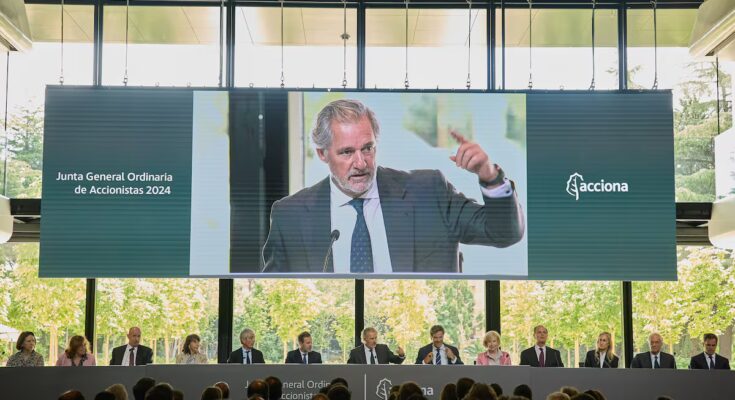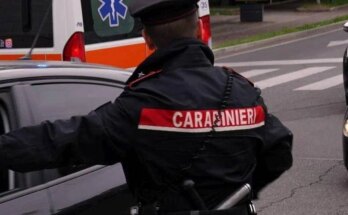The theory goes that large companies must team up with smaller, local ones to have a better chance in public works competitions. In the case of Acciona, the multinational founded by the Entrecanales family, and of Servinabar, a Navarre SME created ten years ago and which had no more than a dozen employees, the theory falls short. According to the latest UCO report on the alleged corruption plot of the The Cerdan casethe collaboration of both companies has reached the entire peninsula: from a tunnel in northern Navarra to a bridge in Seville, passing through a motorway in Logroño and railway works in Sant Feliu de Llobregat (Barcelona). Of this collaboration, the UCO found traces only of one posted worker from Servinabar, in the case of Seville: Santos Cerdán’s brother-in-law, who is a bricklayer.
Acciona would have paid a bribe in exchange for these works, all contracted by the Ministry of Transport under the direction of the socialist José Luis Ábalos, or by one of its dependent bodies (Adif and General Directorate of Highways). Between the corrupting company and the corrupt administration, however, the small company of Antxon Alonso, a close friend of Cerdán, channeled the commissions, approximately 2% of each work, which were then distributed between Cerdán, Koldo and Ábalos, as suggested by the audio found during the search of the latter’s home. According to the UCO, 75% of Servinabar’s revenue came from Acciona. Around six million euros, as emerged from the judicial investigation in July.
The four large public works analyzed in the UCO report amount to more than 300 million euros, of which 2% would have gone to the project through Servinabar, the SME founded by Antxon Alonso, businessman and close friend of Santos Cerdán. Acciona assured yesterday in a statement that under no circumstances can the payments to Servinabar “be considered facilitation payments for the awarding of public works”.
The other paradox is that modus operandi described by the UCO It was born around a private project, the exploitation of a mine on the border between Navarra and Aragon.
Miga Muga. The project to exploit a mine in Sangüesa, in the hands of an Australian capital company, was the first in which several of the protagonists of the alleged conspiracy began to operate. In 2015, Alonso created Servinabar. And that year, a few months later, a first Acciona-Servinabar joint venture was created for an exploitation that would last five years. Although in the years when these companies collaborated most closely around the mine, between 2015 and 2018, none of the administrations involved were socialist, the new UCO report highlights that it was in 2019 that the project obtained the Environmental Impact Statement from the Ministry, with Ábalos already at the helm. In 2021, Servinabar stopped participating in UTE and Acciona continued to work for the Australian-backed company, although the project was halted due to an environmental complaint in court.
What was truly decisive in that period were the personal relationships that were established between Acciona, first through the then Commercial Delegate of Acciona in Navarra, Fernando Merino, and then directly with the Managing Director of Construction, Justo Vicente Pelegrini, and Servinabar, through its founder, Antxon Alonso. This is reflected in the exchange they had Whatsapp Antxon and Pelegrini, then managing director of Acciona Construction for Spain, Portugal and North Africa, who the Supreme Court has just indicted. The first sent him an article about Mina Muga on the occasion of the approval of the DIA by the Ministry of Ábalos in 2019, and the head of Acciona replied: “On their own they don’t even reach the corner”, referring to the Australians…
Logrono. On 19 December 2018, with Ábalos already at the Ministry of Transport, and just four days after the tender for a section of the A-68 motorway, in Logroño, Servinabar and Acciona signed a “memorandum of understanding” according to which the company of Alonso, a close friend of Cerdán, would provide workplace consultancy to prevent professional risks. And that, if the tender was won, the collaboration would expand to work related to safety.
Four months later, on April 22, as soon as the envelope with the financial offers was opened, the head of the General Directorate of Highways, Javier Herrero, also accused of these facts at the National Court, sent a message to Koldo: “Bingo!!! In Logroño”. Immediately afterwards, Koldo wrote to his boss from the time in Navarra, Santos Cerdán: “In La Rioja it has already been done”.
On 19 September, the tender contract in favor of Acciona was published, for an amount of 92 million euros. A month later, the agreement envisaged by the memorandum was signed according to which Servinabar, in exchange for his services, would receive just over 2 million euros. 2.19% of the total budget of the work.
Seville. The impatience that Cerdán showed towards the renovation work on the Centenary Bridge in Seville was well known. “Obsessed with Seville, with the bridge,” according to the summary that Koldo provided to Ábalos on April 9, 2019, in one of the conversations that the former secretly recorded and of which the UCO recovered the audio during the search of his house. Two weeks later, Koldo informed Cerdán how much pressure needed to be put on the undersecretary of the General Directorate of Highways, Pedro Saura, to approve the tender for this emergency work. The works, in two phases, would end up being carried out by Acciona, for an amount of around 90 million euros.
The UCO only found the invoices that Servinabar issued for the first phase, the emergency work for the replacement of the bridge’s stays, for an amount of 170,000 euros. However, it is underlined that “the work that was to be carried out by the company managed by Antxon was specified in such general terms that it is impossible (…) to know what specific work was entrusted to Servinabar”. Nonetheless, the UCO underlines that “following art modus operandi relieved, a Memorandum of Understanding was initially signed which set the amount that Servinabar would receive at 2% of the total awarded.” And he concludes by estimating that, in the total of the works, this would mean approximately 1,800,000 euros.
Sant Feliu de Llobregat (Barcelona). The third of the works does not involve the General Directorate of Motorways, but rather the ADIF. As in the case of Javier Herrrero, the then suspected president of ADIF, Isabel Pardo de Vera, is accused before the National Court. Even in this case there is a Memorandum of understanding between Acciona and Servinabar and, as in the previous two, in two phases: a presumed technical assistance during the preparation phase of the technical-economic offers and, during the execution of the project if Acciona’s offer is successful. Since the works involved a railway line, this time it was the president of the ADIF, Pardo de Vera – in Logroño it had been Herrero, the director of the DGC – who gave the news to Koldo: “Apertura Sant Feliu”. Acciona was awarded the contract for an amount of almost 52 million euros. Just over one million euros, “spread over 44 months”, went to Servinabar. Once again around 2%.
Tunnel Belate. The expansion of the Belate tunnel in northern Navarre was awarded in December 2023, more than two years after Ábalos left the ministry. But to understand why the UCO cites this work in its latest report, as well as why the main entrepreneurial players, Servinabar and Acciona, repeat themselves, we must refer to the origin of the project, when in 2019 the Ministry committed to contributing 40 million, almost half the cost of the work; and the presence of Santos Cerdán, then secretary of the PSOE Organization, at the crucial meeting from which that commitment emerged. As in Minister Ábalos’ official trip to Morocco, Cerdán mixed the agenda of the government and the party.
The UCO lists the irregularities described in a complaint that the Popular Union of Navarro (UPN) presented to the Guardia Civil of Pamplona and that controversies over this award of more than 70 million euros – the largest public work of the regional community in the last ten years – have been brought to light in recent months. Among these, that the Navarre government extended the working life of the president of the table beyond the retirement age, that said president reserved the decisive vote that decided the concession, that the confidentiality of the process was not respected, that the technical reports suffered from a lack of justification of the scores and that the voices guessed the name of the successful tenderer well in advance (Acciona, in joint venture with Servinabar). At the request of the UCO, the investigating judge will decide whether this work is among those under investigation in the Supreme Court case.



